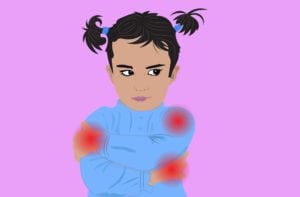For adults with inflammatory arthritis, a “treat-to-target” approach — which entails treating the disease as aggressively as needed to reach a predetermined goal such as remission or low disease activity — has long been the rule. But whether or not children should be treated the same way has been somewhat unclear. The most recent American College of Rheumatology guidelines for the treatment of juvenile idiopathic arthritis (JIA) don’t mention treat to target, yet in 2018 an international task force published a statement strongly recommending it, despite noting that “the evidence is not strong and needs to be expanded by future research.”
Now some new research is here, and it adds to the proof that treat to target might be the best way to address JIA.
The study, published in the journal Pediatric Rheumatology, contained only 60 patients, but it relied on data from a randomized clinical trial that had three arms. One group initially took the disease-modifying antirheumatic drug methotrexate alone, the second started with methotrexate and prednisone (designed to be taken for the short-term as a type of “bridge therapy” until methotrexate kicked in), and the third started on methotrexate along with the biologic drug etanercept (Enbrel).
All of the groups were treated to target with a goal of remission. Patients were assessed every three months and treatment was changed if patients were not showing an adequate response at these intervals. Some of those in the first two arms added etanercept to their regimen. Participants had X-rays of one or both hands at the time the study began or within the four months leading up to it.
Initially, those with JIA did not have any notable damage to the bones in their wrists (comparable to what was found in healthy controls). That held true after 24 months of follow-up, even though in the past joint damage in the wrists has typically been visible in JIA patients by the two-year mark. Bone density had not changed, and deformities and erosions had not developed.
“Combined with rapid suppression of symptoms of active arthritis, prevention of damage is an important treatment goal in JIA,” the authors wrote. “We propose that with earlier start of treatment and treatment to target, the focus of current treatment regimens shifts to damage prevention rather than suppression of damage progression. This will likely also prevent long-term disability.”
Keep Reading
- Caring for Children with Juvenile Idiopathic Arthritis (JIA): A Parent’s Guide
- Growing Pains or Juvenile Arthritis? How to Tell the Difference
- The Arthritis Home Remedies Patients Swear By






